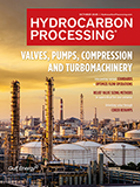Refining
Europe’s downstream industry remains resilient
The European hydrocarbon processing industry (HPI) is a complex set of refineries and petrochemical facilities distributed among several nations, all of which are critical to the international trading and economy of the EU.
Develop an optimal cleaning strategy for crude preheat trains
Fouling in heat exchangers is common throughout the process manufacturing industries. Fouling presents a large opportunity for owner-operators to reduce operating expenses and maintenance costs.
Update: Personnel changes introduce new considerations for PSM
Management of change (MOC) for process safety is well known, widely implemented and used by many employers, even when there is no regulatory requirement to do so, particularly in companies with complex and/or highly hazardous operations involving flammable, toxic chemicals and/or combustible dust.
Overcoming the challenges of the ‘great crew change’
The hydrocarbon processing industry (HPI) is facing a daunting challenge in the near future: In the next five to seven years, approximately 50% of the workforce will retire in what many are calling the ‘great crew change.’ The next generation of engineers, operators, technicians and skilled workers must step up to continue the pursuit of technological innovations and industry growth.
HP Editorial Comment: Convergence of trends supports HPI opportunities
The downstream industry is halfway through 2015 and the second decade of the new millennium. Great changes have occurred over the past 12 months and five years. Change is not necessarily negative; in fact, it can be a welcome event.
HP Automation Strategies: Manufacturing execution systems can help ‘onboard’ the next generation of workers
Population dynamics, including the impending retirement of the “baby-boomer” generation of workers and the associated need to quickly “onboard” the next generation of workers in the downstream industries are driving new demand for collaborative production systems/manufacturing execution systems solutions.
HP Project Management: Consider a modular approach to constructing condensate splitters
Although the 1975 ban on crude oil exports remains in place, US oil producers have found more opportunities in shipping condensate both domestically and internationally. This practice is possible due to condensate splitters, which provide a workaround solution by separating crude oil into lighter byproducts. Because these lightly refined byproducts can be exported, investment in new condensate splitter capacity has grown.
HP News
UAE FCC catalyst manufacturing facility completes Phase 1W. R. Grace & Co. and JV partner Al Dahra Agriculture Co. marked the commissioning of a new catalyst logistics silo terminal (pictured) and the..
HP Industry Metrics
US refinery utilization rates have returned to summer operating levels. Crude oil pricing supports higher cracking margins for gasoline in US and European markets. Asian margins fell as increasing sup..
HP Innovations
Air Liquide will build the world’s largest air separation unit (ASU) in Secunda, South Africa. An essential component of the 5,000-metric-ton-per-day ASU will be the AIRMAX compressor solution from MAN Diesel and Turbo, which will be the largest-dimension compressor constructed to date.

- XRG to expand its global chemicals reach with takeover of Covestro 11/21
- Armstrong International to double heat pump production capacity in Herstal, Belgium 11/21
- U.S. FERC explores blanket authorizations for LNG projects 11/21
- thyssenkrupp Uhde selected by Dangote Fertilizer Ltd. to license four urea granulation units in Nigeria 11/21
- Indian and Chinese refineries are moving to comply with U.S. sanctions on Russia 11/21
- Dynamis Power Solutions awards Baker Hughes with significant order for gas turbine technology to support mobile power for oil and gas applications 11/21




